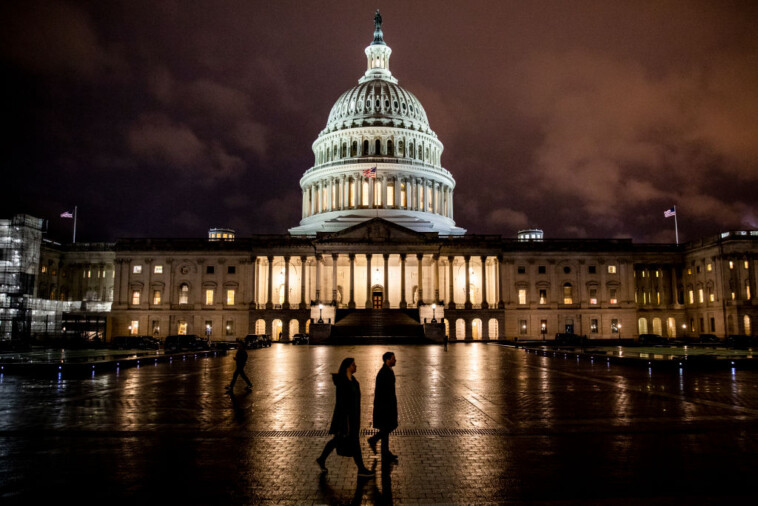A foreign billionaire is using an American dark money organization to boost a ballot initiative that could permanently change the balance of power in the U.S. House of Representatives.
Hansjorg Wyss has poured a quarter of a billion dollars into the Sixteen Thirty Fund, a left-wing money clearinghouse that has spent $7 million to push Ohio to vote yes on “Issue One,” a ballot initiative that would change how electoral districts are drawn.
If the ballot initiative passes, it would require that the proportion of Democrat-leaning House seats be proportional to how many Democrats live in the state, even if those Democrats are concentrated in just a few districts. That could strip several House seats from Republicans — who currently control the lower chamber by a razor-thin margin — in 2026.
But Issue One would boost Democratic power at the expense of community representation. In particular, the initiative is likely to disburse the power currently held in majority-black urban areas. When Michigan redrew its districts in a similar way in 2021, it gave Democrats more seats in Congress, but left Detroit without a black congressman for the first time in 70 years.
Some black Democrats aren’t happy with this trade off – particularly because the effort is funded by a Swiss billionaire.
“These are people that are supposed to be our political allies, but look at what they are doing to black interests,” Sherry Gay-Dagnogo, a former Michigan state delegate, told The Daily Wire.
“When you think about how much money has been dumped into this thing from out of state and even out of the country, what African American organization is going to be able to look at that and hire a lawyer and push back?” Gay-Dagnogo, a black Democrat, said.
Proponents of Ohio’s ballot initiative have spent $37 million to advance the issue. Nearly 90% of that money has come from out of state, financial disclosures show. A group called Citizens Not Politicians (CNP) has spent $11 million. Nearly $7 million of CNP’s money came from the Sixteen Thirty Fund.
Because Wyss is not a U.S. citizen, he is not permitted to spend money to impact candidate elections. But Sixteen Thirty appears to have identified a loophole: That generally doesn’t apply to state-level ballot initiatives. The Daily Wire previously reported the fund has spent more than $21 million this cycle on such initiatives.
Sixteen Thirty gave $550,000 to CNP as it got off the ground in October 2023. On May 23, 2024, Ohio Governor Mike DeWine announced that he intended to have the legislature vote on a bill to ban foreign spending on ballot initiatives. The same day, Sixteen Thirty sent $6 million to CNP. CNP then spent every penny it had before the law actually went into effect, with its July campaign finance report showing $0 cash on hand.
The law prohibiting foreign funding of ballot measures was also challenged in court by Democrat lawyer Marc Elias, who has previously served as Wyss’s lawyer. The suit challenging the Ohio law did not name Wyss as a plaintiff, with Elias instead saying he was representing others including a nonprofit advocating for nonbinary Asians.
CNP did not return a request for comment.
The initiative could require that the percent of House seats that were favorable to each party be within three percentage points of Ohio’s “statewide partisan preference.” But the devil is in the details.
DeWine won the popular vote in every county but three, and captured 62% of the popular vote. But the bill would calculate the state’s purported partisan preference based on an average of statewide elections in the last six years, reaching back to a time when Ohio was considerably less red.
Issue One backers’ message is that it makes the process less political by setting up a citizen commission to draw boundaries rather than lawmakers. While the 15-person commission would consist of equal numbers of Democrats, Republicans, and independents, they will all be laymen, not politicians, and opponents say bias could overtake the commission in the likely event that members enlist experts to help them with their complicated task.
“Anytime you set up a commission where the people have no experience drawing maps…they were at the mercy of an alleged expert,” Gay-Dagnogo said. “When will the citizens have an opportunity to draw a map? They will not.”
Frank Strigari, a Republican attorney and former Ohio state Senate aide who has been involved in redistricting issues, said these experts were likely to be left-leaning academics. That, he said, could lead to most of Ohio’s 15 congressional seats going to Democrats, even as a majority of Ohioans vote Republican. That’s because some of the nominally Republican-leaning districts could have only a narrow edge, lacking resistance to ebbs and flows such as backlash to a Republican president during midterm season, while the Democrat ones could be more bulletproof.
If Issue One succeeds, the idea is likely to spread to other states as Democrats reverse their longstanding position on “gerrymandering” to rectify the fact that their party’s power is increasingly confined to urban areas.
Previously, both parties viewed oddly-shaped districts as unfair, and preferred districts that reflected organic communities and allowed congressmen to represent a defined constituency. For instance, a predominantly-black district city would have its own congressional district, which would likely elect a black congressman. This in particular was important to Democrats.
But now, Democrats view overwhelmingly-Democratic urban and black districts as a waste, full of surplus Democratic votes that could be spread out through creative boundary drawing into purple districts they could tip blue. Under Ohio’s proposal, preserving such “communities of interest,” is a secondary goal, to be achieved to “the extent practicable.”
“They’re cutting up just enough of the black districts to give the Democrats an edge, but not considering the cultural barriers, the impact of not having a person in Congress to advocate for the needs of those in poverty,” Gay-Dagnogo said.
Jason Snead of the Honest Elections Project, which opposes Ohio’s Issue One, says Democrats’ embrace on the issue proves they know the commission will favor their party.
If Democrats really believed “citizen-led” commissions were the best option, Snead said, “you’d see them doing it in states like Illinois and Oregon,” where the commissions could boost Republicans.
“But you don’t,” Snead added.



